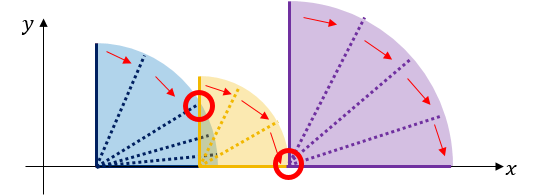\(>Codeforces \space 500 E. New Year Domino<\)
题目大意 : 数轴上有序排列着 \(n\) 块多米诺骨牌, 第 \(i\) 块骨牌坐标为 \(p_i\) 长度为 \(l_i\)
如果推倒坐标为 \(p_i\) 的多米诺骨牌,那么区间 \([p_i, p_i + x_i]\) 中的多米诺骨牌都会被推倒,从而发生连锁反应.
现在有 \(q\) 组询问,每次询问之前可以让一些多米诺骨牌增加任意长度,代价是增加的长度之和。
询问的内容是每次推倒第 \(x\) 块骨牌,求要推倒第 \(y\) 块至少要花费的代价 ?(询问之间相互独立)
\(2 \leq n , q\leq 2 \times 10^5 \ 1 \leq p_i, l_i \leq 10^9\)
解题思路 :
观察发现,多米诺之间的连锁反应可以合并成一个块,每次从右到左每次新加骨牌的时候可以合并被它覆盖的块。
但是直接按照定义合并的话,只能保证一个块最左边的块可以推倒整个块,也就是说一个块的贡献只有在推倒整块最左边的骨牌时是合法的
仔细想了很久觉得并没有什么做法可以在线求出 \(x\) 对应的合法联通块,不妨大胆离线.
离线后按照询问的左端点排序,从右到左扫,边扫边用一个栈维护此时的联通块的状态和联通块之间的距离
对于每一个扫到的 \(i\),在其合并完之后处理 \(i\) 作为左端点的询问的答案
因为此时 \(i\) 左边的点还没有被加进联通块,所以从 \(i\) 开始推一定是合法的, 对于每一个左端点在 \(i\) 上的询问,算出两个联通块之间的距离就是答案
/*program by mangoyang*/
#include<bits/stdc++.h>
#define inf (0x7f7f7f7f)
#define Max(a, b) ((a) > (b) ? (a) : (b))
#define Min(a, b) ((a) < (b) ? (a) : (b))
typedef long long ll;
using namespace std;
template <class T>
inline void read(T &x){
int f = 0, ch = 0; x = 0;
for(; !isdigit(ch); ch = getchar()) if(ch == '-') f = 1;
for(; isdigit(ch); ch = getchar()) x = x * 10 + ch - 48;
if(f) x = -x;
}
#define int ll
#define N (1000005)
int fa[N], l[N], r[N], st[N], sum[N], Ans[N], n, m, top;
struct Query{ int x, id; }; vector<Query> q[N];
inline int ask(int x){ return x == fa[x] ? x : fa[x] = ask(fa[x]); }
main(){
read(n);
for(int i = 1, x, y; i <= n; i++)
read(x), read(y), l[i] = x, r[i] = x + y;
for(int i = 1; i <= n; i++) fa[i] = i;
read(m);
for(int i = 1, L, R; i <= m; i++)
read(L), read(R), q[L].push_back((Query){R, i});
for(int i = n; i >= 1; i--){
int x = i;
while(top && l[st[top]] <= r[x]){
r[x] = Max(r[x], r[st[top]]);
fa[ask(st[top])] = x, top--;
}
if(top) sum[x] = sum[st[top]] + l[st[top]] - r[x];
st[++top] = x;
for(int j = 0; j < q[i].size(); j++){
int id = q[i][j].id, y = q[i][j].x;
Ans[id] = sum[ask(x)] - sum[ask(y)];
}
}
for(int i = 1; i <= m; i++) printf("%lld\n", Ans[i]);
return 0;
}
